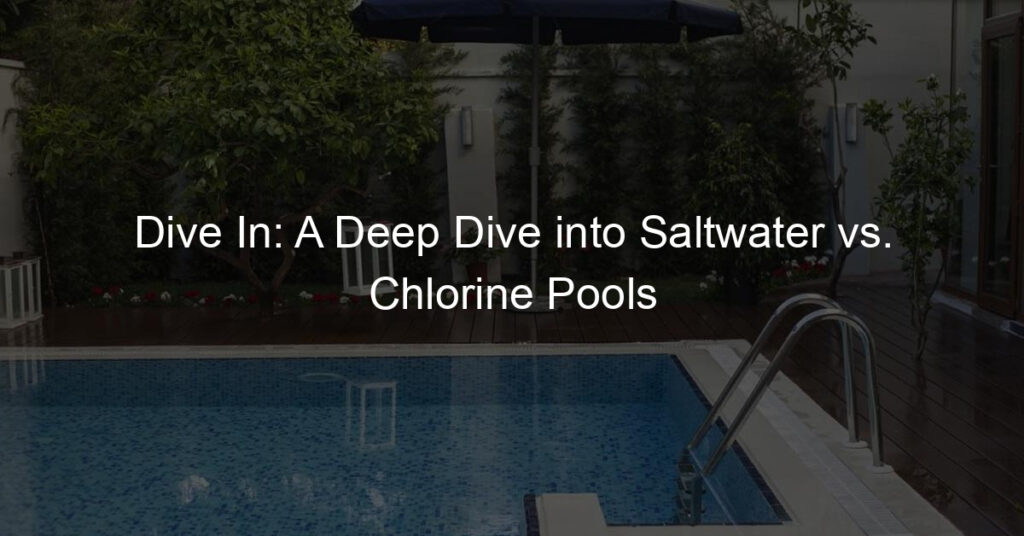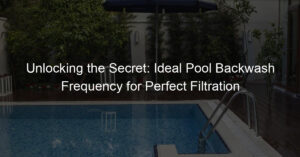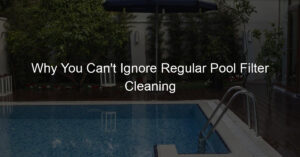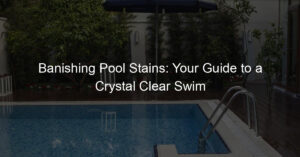Introduction: Saltwater vs Chlorine Pools
When it comes to swimming pools, there are two main types that you might encounter: saltwater and chlorine. Both have their own unique features and benefits, making them suitable for different situations and preferences. This blog post aims to provide a comprehensive comparison between these two types of pools, helping you make an informed decision when choosing the right one for you.
- Overview of the topic:
- Importance of understanding the differences:
Saltwater and chlorine pools are the two most common types of swimming pools. Saltwater pools, as the name suggests, use salt to keep the water clean. The salt is converted into chlorine through a process called electrolysis, which then disinfects the water. On the other hand, chlorine pools use chlorine tablets or liquid to sanitize the water. Both types of pools have their own advantages and disadvantages, which we will explore in detail in this post.
Understanding the differences between saltwater and chlorine pools is crucial for several reasons. First, it can help you make an informed decision when choosing a pool for your home or business. Second, it can help you understand the maintenance requirements of each type of pool, which can save you time and money in the long run. Lastly, it can help you understand the potential health and environmental impacts of each type of pool, enabling you to make a choice that aligns with your values and priorities.
Whether you’re a pool owner, a potential pool buyer, or simply someone interested in learning more about pools, this post will provide you with the information you need. So, let’s dive in and explore the world of saltwater and chlorine pools!
Understanding Saltwater Pools
One of the most popular alternatives to traditional chlorine pools is the saltwater pool. But what exactly is a saltwater pool, and how does it work? Let’s delve into the specifics.
Saltwater Pool Systems
Saltwater pool systems are unique in their operation and components. Here’s a closer look at how they function and what they consist of.
- How Saltwater Pool Systems Work
- Key Components of a Saltwater Pool System
Saltwater pools use a process called electrolysis to sanitize the water. This involves passing a low voltage electrical current through the pool water, which contains a small amount of salt (around one-tenth the salinity of the ocean). This current breaks down the salt (sodium chloride) into hypochlorous acid and sodium hypochlorite, which are powerful sanitizing agents. These agents kill bacteria, algae, and other harmful organisms, keeping the pool water clean and safe.
A saltwater pool system consists of several key components. The most important of these is the salt cell, or chlorine generator, which is responsible for the electrolysis process. The salt cell contains metal plates that carry the electrical current. Another crucial component is the control box, which allows you to regulate the amount of chlorine produced. Finally, the system includes a saltwater chlorinator, which adds the necessary amount of salt to the pool water.
Understanding these aspects of saltwater pool systems can help you make an informed decision about whether this type of pool is right for you. Remember, while saltwater pools require less maintenance than traditional chlorine pools, they still require regular care to ensure the system is working properly and the water remains clean and safe.
Saltwater Pool Benefits
When considering a pool for your home, it’s important to understand the benefits of a saltwater system. Saltwater pools offer a range of advantages, including health benefits, lower maintenance requirements, and increased comfort and enjoyment. Let’s explore these benefits in more detail.
- Health benefits of saltwater pools
- Lower maintenance requirements
- Comfort and enjoyment factors
Saltwater pools are known for their health benefits. The saltwater in these pools is gentle on the skin and eyes, reducing the irritation often associated with traditional chlorine pools. The saltwater also has a softening effect on the skin, leaving it feeling smooth and refreshed. Plus, the saltwater can help to promote relaxation and reduce stress, contributing to overall well-being.
Another major benefit of saltwater pools is their lower maintenance requirements. Unlike chlorine pools, which require regular addition of chemicals to maintain the water balance, saltwater pools use a salt cell to naturally produce chlorine. This means less time and money spent on pool maintenance, and more time enjoying your pool.
Finally, saltwater pools offer a high level of comfort and enjoyment. The water in a saltwater pool feels softer and more luxurious than in a traditional chlorine pool, enhancing the swimming experience. Plus, there’s no harsh chlorine smell, making your time in the pool even more enjoyable. Whether you’re swimming laps, playing pool games, or simply relaxing in the water, a saltwater pool can enhance your enjoyment.
In conclusion, saltwater pools offer a range of benefits that can enhance your pool ownership experience. From health benefits to lower maintenance requirements to increased comfort and enjoyment, a saltwater pool is a great choice for any homeowner.
Understanding Chlorine Pools
Chlorine pools are a popular choice for many homeowners. They are known for their ability to keep water clean and clear. But how do they work? Let’s dive in and explore the workings of chlorine pool systems.
Chlorine Pool Systems
Chlorine pool systems are designed to sanitize your pool by killing bacteria and other harmful organisms. They do this through a process known as chlorination.
- How chlorine pool systems work
- Key components of a chlorine pool system
Chlorine pool systems work by adding chlorine to the pool water. This chlorine then reacts with the water to form hypochlorous acid and hypochlorite ion. These two substances kill bacteria and other harmful organisms in the water, keeping your pool clean and safe to swim in.
A chlorine pool system consists of several key components. These include a chlorine feeder, which adds chlorine to the water, and a pool filter, which removes debris from the water. The system also includes a pump that circulates the water, and a pool heater, which controls the water temperature.
Understanding how chlorine pool systems work and the key components involved can help you maintain your pool effectively. Remember, a well-maintained pool is not only more enjoyable to swim in, but also safer for you and your family.
Effects of Chlorine Pools
Chlorine pools, while popular, can have a range of effects on users and their surroundings. These effects can be categorized into three main areas: health effects, maintenance requirements, and comfort and enjoyment factors.
- Health effects of chlorine pools
- Maintenance requirements
- Comfort and enjoyment factors
Chlorine is a chemical used to kill bacteria and other harmful organisms in pool water. However, prolonged exposure to chlorine can have certain health effects. Some people may experience skin irritation or dryness, while others may have mild respiratory discomfort due to the inhalation of chlorine fumes. It’s important to note that these effects are usually mild and can be managed with proper care and hygiene.
Maintaining a chlorine pool requires regular testing and adjustment of the water’s chemical balance. This includes monitoring the chlorine level, pH, alkalinity, and calcium hardness. It’s also necessary to shock the pool periodically to eliminate contaminants. This process can be time-consuming and requires a basic understanding of pool chemistry.
Chlorine pools can provide a refreshing and enjoyable swimming experience when maintained properly. However, some people may find the smell of chlorine off-putting. Additionally, the chlorine can cause swimsuits and pool toys to fade over time. Despite these factors, many people enjoy the crisp feel of a well-maintained chlorine pool.
In conclusion, while chlorine pools have their unique set of requirements and effects, they remain a popular choice due to their effectiveness in keeping pool water clean and safe.
Comparing Saltwater and Chlorine Pools
When it comes to choosing a pool, the decision between saltwater and chlorine can be challenging. Both have their advantages and disadvantages. Let’s take a closer look at the differences between these two types of pools.
Detailed Comparison of Pool Types
There are several factors to consider when comparing saltwater and chlorine pools. These include maintenance requirements, health effects, and cost. Let’s dive in to understand these factors better.
- Comparison of maintenance requirements: Chlorine pools require regular testing and addition of chemicals to maintain the right balance. This can be a weekly task. On the other hand, saltwater pools require less frequent maintenance. The saltwater system automatically converts salt into chlorine, maintaining a steady level of chlorine in the water. However, the salt cell in a saltwater system needs to be replaced every 3-7 years, which can be costly.
- Comparison of health effects: Chlorine pools can cause skin and eye irritation for some swimmers. They can also exacerbate asthma and other respiratory issues. Saltwater pools are generally gentler on the skin and eyes, and they do not have the strong chlorine smell associated with traditional chlorine pools. However, the salt can be corrosive to pool equipment and surrounding surfaces.
- Comparison of cost: The initial cost of a saltwater pool can be higher than that of a chlorine pool due to the need for a saltwater generator. However, the ongoing costs can be lower because you do not need to purchase chlorine regularly. Chlorine pools, on the other hand, have a lower initial cost but higher ongoing costs due to the need for regular chlorine purchases.
In conclusion, the choice between a saltwater and a chlorine pool depends on your personal preferences, budget, and maintenance capabilities. Both types of pools can provide a refreshing and enjoyable swimming experience, but they offer different features and require different levels of care and investment.
Cost of Saltwater vs Chlorine Pools
When it comes to choosing between a saltwater pool and a chlorine pool, cost is a significant factor to consider. Let’s break down the costs into three main categories: initial setup cost, ongoing maintenance cost, and cost of potential health effects.
- Initial Setup Cost
- Ongoing Maintenance Cost
- Cost of Potential Health Effects
The initial setup cost for a saltwater pool can be higher than a chlorine pool. A saltwater pool system can cost between $1,500 and $2,500, while a chlorine pool can cost around $300 to $800. However, it’s important to remember that a higher initial cost can mean lower ongoing costs.
Chlorine pools require regular addition of chlorine, which can add up over time. On the other hand, saltwater pools convert salt into chlorine, reducing the need for frequent chemical additions. This can result in lower maintenance costs over time for saltwater pools, despite the higher initial setup cost.
Chlorine pools can sometimes lead to skin, eye, and respiratory irritation. These potential health effects can result in additional costs for treatment. Saltwater pools, on the other hand, are often seen as gentler on the skin and eyes, potentially reducing these additional health-related costs.
In conclusion, while saltwater pools may have a higher initial setup cost, they can potentially save you money in the long run with lower maintenance costs and fewer health-related expenses. However, the choice between a saltwater and chlorine pool should also take into account personal preference and lifestyle.
Saltwater Pool Conversion
Converting your chlorine pool into a saltwater pool can seem like a daunting task. However, with the right steps and information, it can be a smooth process. Let’s delve into the steps, costs, and pros and cons of such a conversion.
-
Steps to Convert a Chlorine Pool to a Saltwater Pool
Converting a chlorine pool to a saltwater pool involves a few key steps. First, you’ll need to drain your existing pool. Then, you’ll need to install a saltwater system, which includes a salt cell and a control box. After that, you’ll need to add the appropriate amount of salt to the pool and allow it to dissolve. Finally, you’ll need to test the water to ensure the salt levels are correct and adjust as necessary.
-
Cost of Conversion
The cost of converting a chlorine pool to a saltwater pool can vary depending on the size of your pool and the type of saltwater system you choose. On average, the cost can range from $1,500 to $2,500. This includes the cost of the saltwater system and the cost of the salt itself. Remember, while this might seem like a hefty upfront cost, you may save money in the long run due to lower maintenance costs.
-
Benefits and Drawbacks of Conversion
There are several benefits to converting your pool to saltwater. For one, saltwater pools are gentler on the skin and eyes. They also require less maintenance than chlorine pools. However, there are also drawbacks. Saltwater systems can be more expensive upfront, and they can also cause corrosion to certain types of pool equipment and decking.
In conclusion, converting a chlorine pool to a saltwater pool is a decision that should be made after considering the steps, costs, and pros and cons. While it may require an initial investment, the benefits may outweigh the drawbacks for many pool owners.
Conclusion: Choosing the Right Pool for You
After exploring the ins and outs of both saltwater and chlorine pools, it’s time to make a decision. The choice between a saltwater pool and a chlorine pool is a personal one, and it depends on your specific needs, preferences, and circumstances. Let’s wrap up with the key takeaways and personal considerations to keep in mind when choosing the right pool for you.
- Key Takeaways
- Both saltwater and chlorine pools have their own unique advantages and disadvantages.
- Saltwater pools are generally easier to maintain, gentler on the skin and eyes, and offer a more natural feel. However, they can be more expensive upfront.
- Chlorine pools are cheaper to install and have a proven track record of effectively killing bacteria and algae. However, they require more regular maintenance and can be harsher on the skin and eyes.
- The cost of maintaining a pool, whether saltwater or chlorine, can add up over time. It’s important to factor in these ongoing costs when making your decision.
- Personal Considerations When Choosing a Pool
- Your budget: Consider both the initial cost of installation and the ongoing costs of maintenance.
- Your lifestyle: If you prefer a low-maintenance option, a saltwater pool might be the better choice. If you don’t mind regular upkeep and want to save on initial costs, a chlorine pool could be the way to go.
- Your health: If you or your family members have sensitive skin or eyes, a saltwater pool might be more comfortable.
- Your personal preference: Some people prefer the feel of swimming in saltwater, while others prefer the traditional experience of a chlorine pool.
In conclusion, there’s no one-size-fits-all answer when it comes to choosing the right pool. It’s about weighing the pros and cons and making the decision that best suits your needs and preferences. Remember, a pool is a significant investment, so take your time to make an informed decision. Happy swimming!














